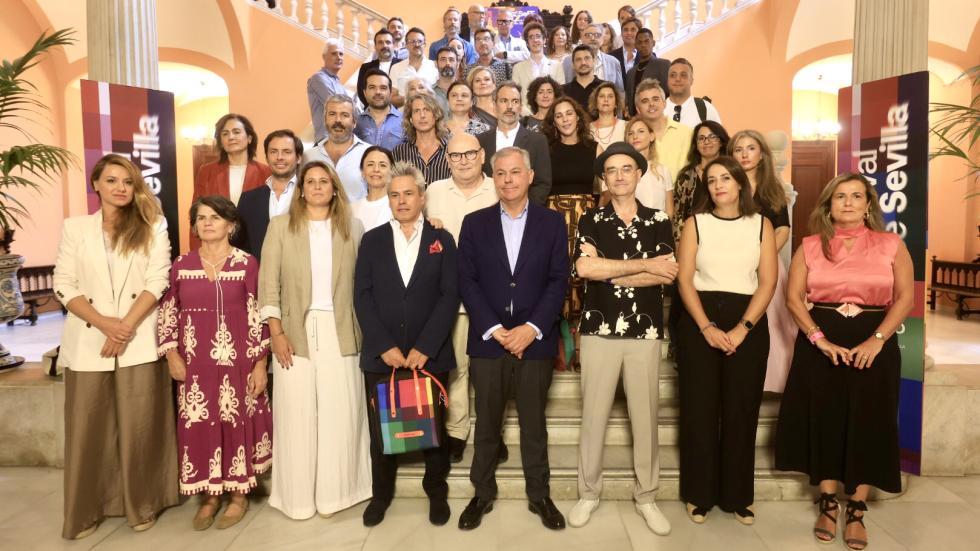
- Seville-based illustrator José Luis Ágreda created the image for this year's festival, inspired by the traditional posters for Seville's spring festivals, to which he has added the iconography of cult European films featuring the cat from 'Flow'.
- The highlights of Cannes, Venice, Toronto, and Berlin will be on display from 7 to 15 November at the 22nd edition, which will pay tribute to French-Greek director Costa-Gavras, Giraldillo de Honor of the Festival.
- The nominations for the 2025 European Film Academy Awards will be announced at the Real Alcázar in Seville on 18 November.
The Seville European Film Festival today presented the image for its 22nd edition in the Salón Colón of the City Hall, as well as a preview of its most relevant content and highlights, reaffirming itself as one of the major cultural events of the Seville autumn, an international benchmark and an essential event for lovers of European cinema. For nine days, from 7 to 15 November, Seville will become a meeting point for dialogue and discovery between audiences, filmmakers, and industry professionals, in a setting that combines major premieres, new talent, and a firm commitment to European cinema in all its breadth.
The presentation ceremony was attended by the Mayor of Seville, José Luis Sanz; the Seville City Council's Delegate for Tourism and Culture, Angie Moreno; the festival director, Manuel Cristóbal; and the creator of this year's image, Seville-born José Luis Ágreda, accompanied by a significant representation from the film and audiovisual sector and industry.
"The Seville Festival has become one of the great cultural events of our city and every year it projects us strongly towards Europe and the world; one of the clearest expressions of how Seville understands culture: as a driving force for identity, creativity, openness and the future," said Sanz during his speech."Not only has it managed to establish itself as a national and international benchmark, but it has also grown, reinvented itself and connected with new perspectives and voices without losing its commitment to quality and talent," added the mayor, who also emphasised how last autumn's edition marked "a turning point in the history of the event, consolidating its position as the leading film festival in Andalusia and the fourth in Spain in terms of audience numbers," as well as showcasing some of the most important films of the year, recognised at the Goya Awards, the European Film Awards, the Golden Globes and the Oscars.
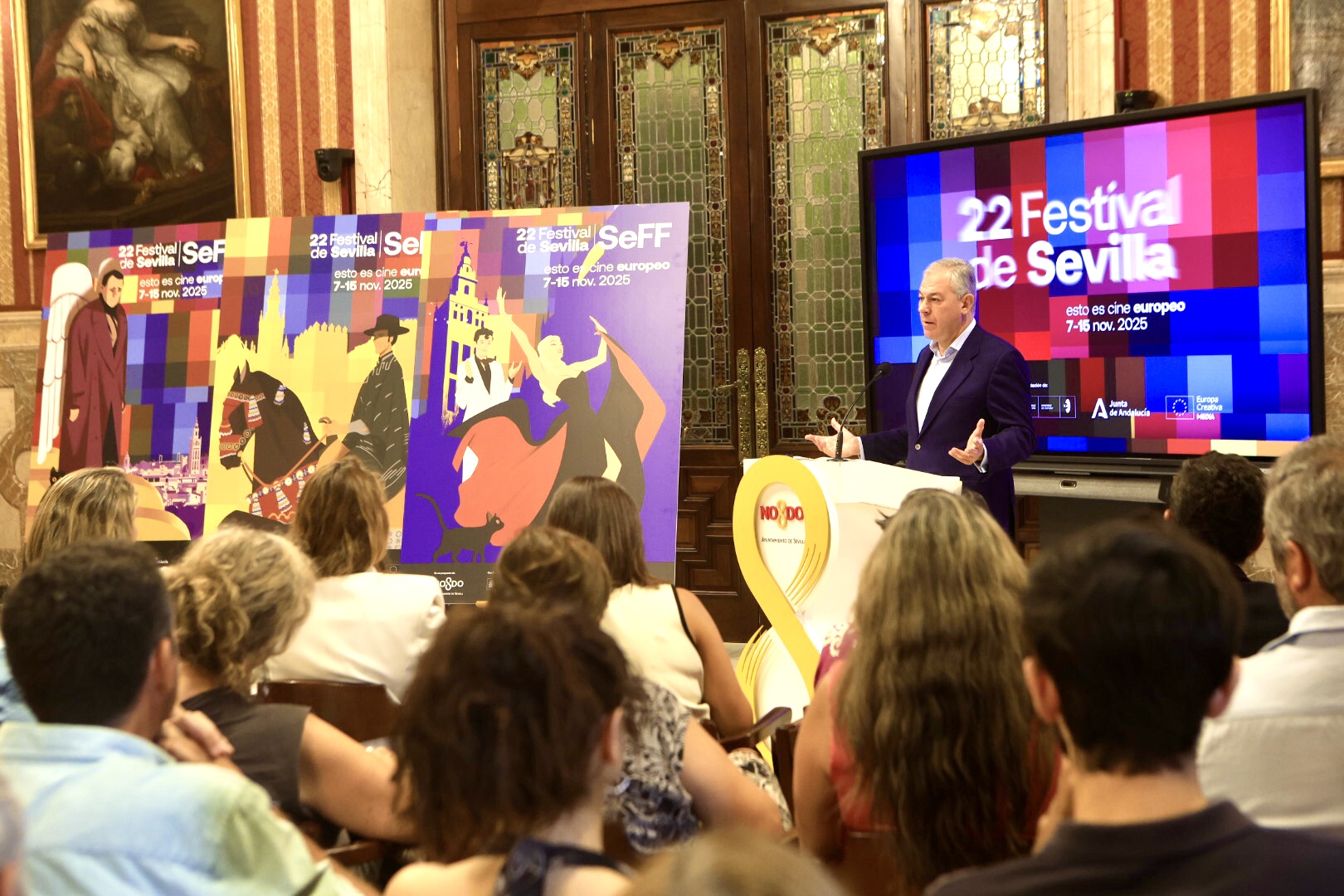
In 2025, the Festival will go even further and reach a milestone that will further amplify its international projection: the return to the city of the official European Film Academy (EFA) Awards nominations ceremony, which will take place on 18 November at the Real Alcázar. After several years without hosting this event, the city will once again take centre stage on the European film map by becoming the venue for the announcement of the nominations for one of the world's most prestigious awards. Thanks to the renewed partnership with the Academy, the city will host the reading every two years, thereby gaining a symbolic and prominent presence in the events held in other European locations.
This celebration not only renews the historical ties between Seville and the EFA but also projects the city's image globally as a privileged space for European cinema to meet its audience and the industry. "Bringing this event back to our city, which had been lost in 2021, has been a personal commitment of this government. It was essential for Seville to return to the heart of the European Academy, and we have achieved this," said the mayor during the announcement.
Giraldillo de Honor for Costa-Gavras
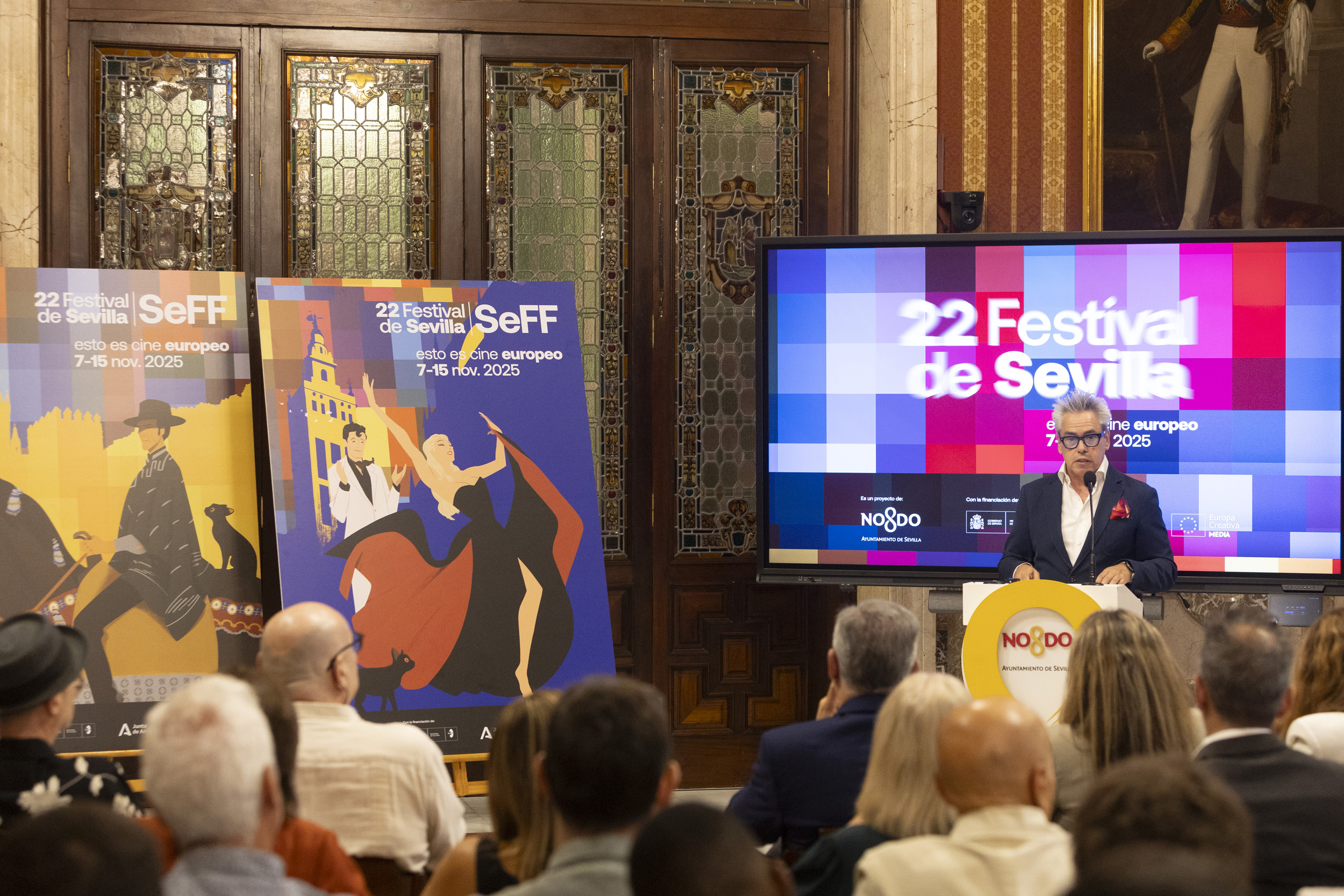
In this first preview, the Seville Festival announced one of this year's protagonists, as it will pay tribute to French-Greek director Costa-Gavras, one of the great names in world cinema, who will receive the Giraldillo de Honor. "It will be a recognition of his extensive and renowned career spanning more than six decades and his firm commitment to courageous, humane, committed, and transformative cinema, which he himself recounts in his memoirs, 'Go Where It Is Impossible to Go'," explained Manuel Cristóbal.
Born in Greece in February 1933, Costa-Gavras (Konstantinos Gavras) emigrated to France in the 1950s, where he studied literature at the Sorbonne and film at the Institut des Hautes Études Cinématographiques. His style, a reference point for the cinema of Oliver Stone and William Friedkin, is defined by political drama, articulated in the form of a thriller. His filmography includes key titles such as 'Z' (1969), about the assassination of a Greek politician, which marked his big international breakthrough as the first non-English film to be nominated for Best Picture and winner of the Oscar for Best Foreign Language Film; 'State of Siege' (1972), a drama set in Latin America, focusing on state terrorism; 'Missing' (1982), a thriller shot in the US about a journalist who disappeared in Chile during the Pinochet dictatorship, starring Jack Lemmon and Sissy Spacek, and winner of the Oscar for Best Adapted Screenplay and the Palme d'Or at Cannes; 'The Music Box' (1989), a family and legal drama about the search for the truth surrounding an alleged Nazi criminal, winner of the Golden Bear in Berlin; 'Amen' (2002), which questions the Vatican's silence on the Holocaust; 'Capital' (2012), a scathing look at corruption in global financial power; and his most recent work, 'The Last Breath' (2024/25), about euthanasia and end-of-life care.
Fellini, Wenders, Leone, and the cat from 'Flow' feature in the image for the 22nd edition
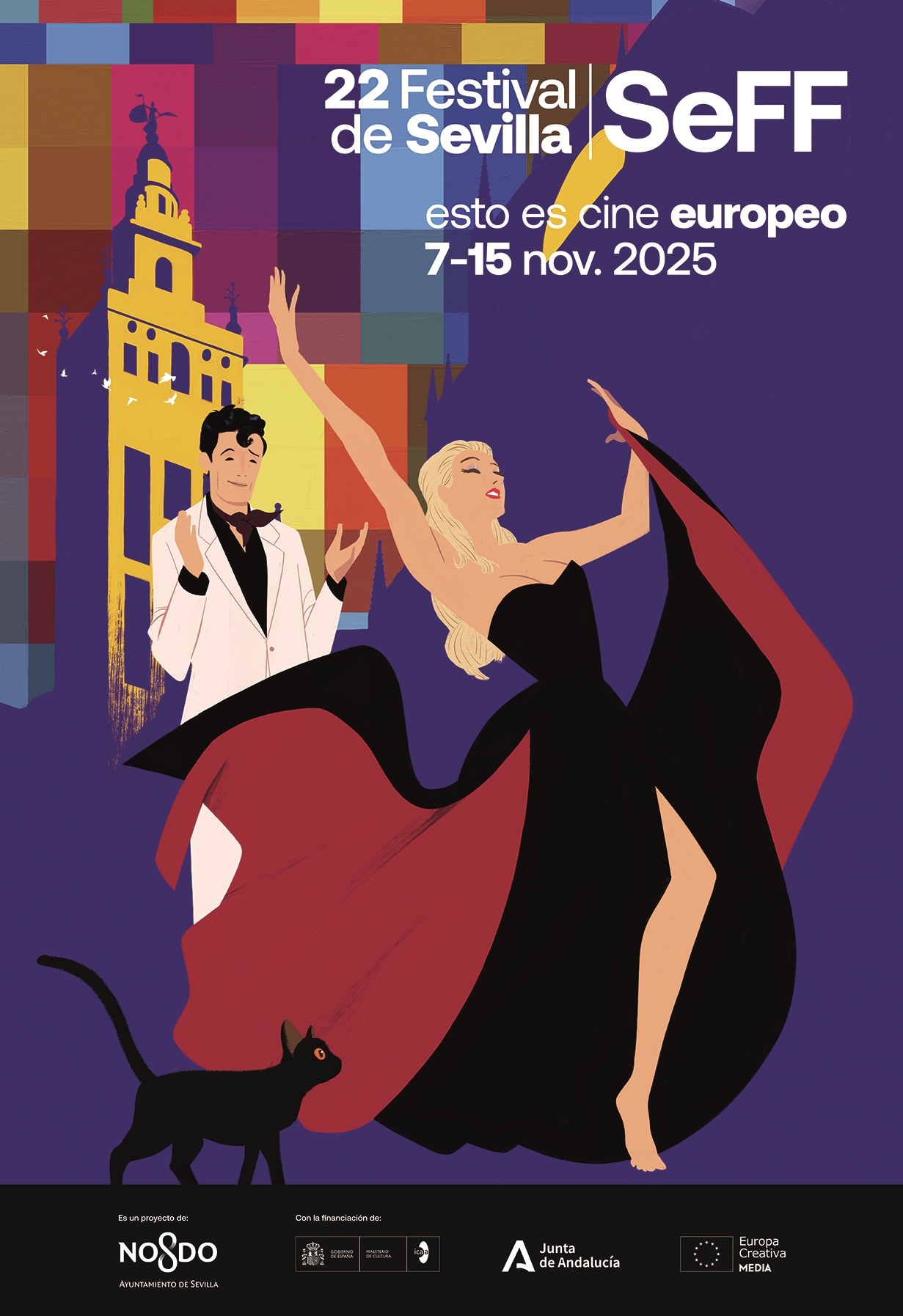
During the event, Seville artist José Luis Ágreda presented a triptych of posters inspired by traditional posters for Seville's spring festivals from the 1930s, created by artists such as Gustavo Bacarisas, Francisco Hohenleiter de Castro, and Juan Miguel Sánchez. Using the now-iconic multicoloured mosaic of the Seville Festival by designer Pedro Cabañas as an aesthetic parameter, Ágreda develops the imagery created by Federico Fellini, Wim Wenders, and Sergio Leone.
The first poster in the series, which will be the main image of the Festival, evokes 'La Dolce Vita', with Anita Ekberg in her iconic scene at the Trevi Fountain in Rome, transposed here to the Patio de los Naranjos. In the second poster, Ágreda takes the still of the angel climbing the Victory Column at the beginning of the film 'Wings of Desire' (Wim Wenders) and transfers it to the top of the Setas in the Plaza de la Encarnación. In the third poster, Clint Eastwood from 'A Fistful of Dollars' - Sergio Leone's Spanish-Italian production that launched him to fame - arrives in the historic centre, this time riding a decorated horse on his way to the Fair. "I wanted the host city to be present, highlighting the artistic values of both the Seville that has shaped our identity and the more modern, world-class Seville we live in today. That's why I selected those images from European cinema that also contain a defined architectural element that could be transposed to our city," explained Ágreda during his brief presentation on the creative process that guided him.
The cat from 'Flow' by Latvian filmmaker Gints Zilbalodis, which has won major international awards and was one of the winners of the 21st edition of the Seville Festival with the Best Editing Award, the Grand Jury Prize, and the Puerta América Award, appears in all the scenes. "A similar path to that taken by 'Robot Dreams', which passed through Seville before landing at the Academy Awards, demonstrating once again the Festival's support for animation," Ágreda said in gratitude.
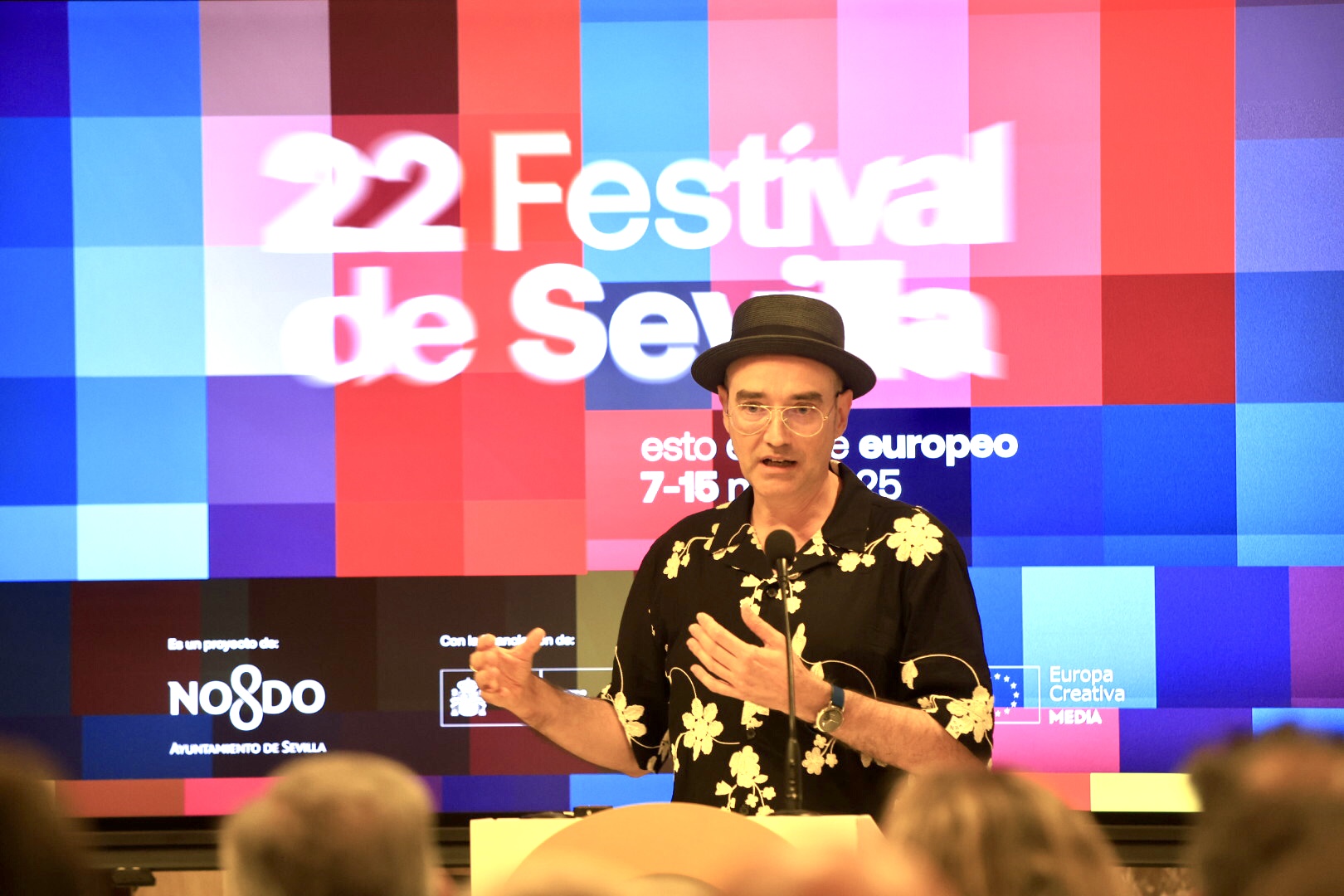
With a very personal style, José Luis Ágreda has been dedicated to drawing in all its possible forms (animation design, editorial illustration, press, advertising, comics, etc.) for nearly 25 years, while in animated cinema, his work as art director on 'Robot Dreams' and 'Buñuel in the Labyrinth of the Turtles' stands out, a role he is currently immersed in with 'Decorado' (Alberto Vázquez). 'Robot Dreams', a film by Pablo Berger, screened at the 20th Seville Film Festival and premiered in 2023 at the Cannes Film Festival. It won the Grand Prix Contrechamp at Annecy, the Goya Awards for Best Animated Film and Best Adapted Screenplay, and the Grand Prix du Public at the Sitges Film Festival, as well as being nominated for an Oscar by the Academy of Motion Picture Arts and Sciences. For its part, Salvador Simó's film, co-written with Eligio R. Montero, won the Jury Prize at Annecy and the 2020 Goya for Best Animated Film. Both were also worthy of the Best Animated Film Award at the European Film Awards.
"José Luis Ágreda has managed to capture in his posters what Seville means to cinema and what cinema means to Seville; a Seville that is not only lived and visited, but also filmed, narrated and dreamed; a tribute to our cultural memory, to our roots, and at the same time a declaration of love for cinema," said Sanz. For his part, the director of the Seville Film Festival highlighted that Ágreda "has created posters that many people will surely want to keep and hang in their homes, posters that showcase European cinema and Seville. Posters that will take over the city and convey the colour and joy of cinema and the city."
Cannes, Venice, Toronto, and Berlin at the 22nd Seville Festival

The Seville Film Festival confirms its vitality and broad outlook, featuring around 180 titles in its programme. These include films that have stood out at major international festivals and new perspectives that set the tone for contemporary European cinema. "This autumn will be a great celebration of the cinema that beats or is reflected in Europe," said the director, before mentioning some of the films that will be screened in the Official Section. The list of titles includes 'DJ Ahmet', written and directed by Georgi M. Unkovski (Macedonia). A Balkan coming-of-age film that won an award at Sundance 2025, combining humour and social criticism to portray a young man caught between tradition and modernity in a small village in Macedonia. A vibrant story about identity, freedom, and music as a refuge.
In the same competition section, we find 'Dreams', written and directed by Dag Johan Haugerud (Norway), which won the Golden Bear at Berlin 2025. It is the third part of the director's trilogy on human relationships in the form of a delicate reflection on intimacy, writing, and adolescent sexuality—an intertwining story of generations exploring love and the ethics of public exposure.
Also competing in Seville is 'La Petite Dernière', written and directed by Hafsia Herzi (France and Algeria), winner of the Best Actress Award at Cannes for Nadia Melliti. Adapted from the novel by Fatima Daas, the film paints a vibrant and moving portrait of a young Muslim woman who explores her homosexuality in the suburbs of Paris, grappling with the reconciliation of faith, identity, and desire.
The posthumous work of Laurent Cantet, completed by Robin Campillo, who also co-wrote the screenplay with the French master and Gilles Marchand, and presented at Cannes, 'Enzo' (Italy and France) arrives in the Official Section of Seville; a social and emotional snapshot of European youth, manual labour and the search for identity, mixing realism and emotion in a story of friendship and personal discovery.
Animation will be represented in the Seville Festival competition by 'A Magnificent Life', written and directed by four-time Oscar nominee Sylvain Chomet (France, Belgium, and Luxembourg). This animated biopic traces the life of the famous French playwright, novelist, and filmmaker Marcel Pagnol, from his childhood to his rise to fame. The film is a visually stunning work that premiered at Cannes.
Representing Spain in the festival's Official Selection is 'Bajo el mismo sol' (Under the Same Sun) by Ulises Porra, written by himself and Ulla Prida (Spain and Dominican Republic); a story of ambitions, passions, and contradictions set in the colonial Caribbean, which explores the desire for progress and emotional ties in a territory riddled with historical and cultural tensions, premiering at the Toronto Film Festival.
In the Embrujo Section, which this year takes over from Las Nuevas Olas to welcome the most daring and unique voices in European cinema, we find titles such as 'Cosmos', written and directed by Germinal Roaux (Switzerland, Mexico, and France), in which Ángela Molina stars in an intimate drama filmed in Yucatán. It is a poetic reflection on old age and transcendence, exploring love and spirituality through the unexpected connection between a European widow and a Mayan indigenous man.
In the same section, Seville will present 'Writing Life' (France), a new work written and directed by Claire Simon, recently premiered at the Giornate degli Autori in Venice. The great voice of European documentary filmmaking, on this occasion, draws on the writings of Nobel Prize winner Annie Ernaux to offer a choral fresco of contemporary French youth. Students from different secondary schools read and discuss her work, in a generational mirror that addresses issues such as social class, love, sexuality, and motherhood.
And within the Rampa section, which recognises emerging talent from filmmakers at the beginning of their careers, the festival has selected 'The Kidnapping of Arabella', written and directed by Carolina Cavalli (Italy). Presented in the Venice Horizons section, it is an eccentric dramatic comedy that combines tenderness and social criticism through the story of an eight-year-old girl and her complex relationship with her father. An original work that reflects on family ties and generational disenchantment.
In the same vein, the festival will offer 'Le città di pianura', the new work by Francesco Sossai (Italy and Germany), co-written with Adriano Candiago. Selected for Un Certain Regard at Cannes, it is an endearing road movie that combines humour and melancholy through the story of two middle-aged men in search of a last night's shelter, on a journey that is also a tribute to friendship, excess, and second chances.
For the first time in its 22-year history, the Official Section also includes a competitive selection of European live-action and animated short films. "A great festival cannot fail to have a competitive short film section, and for the first time in 22 editions, we have one. It is a commitment to talent. One more, because last year we created Rampa for new directors and a way to reach a broader audience. We are breaking with inertia and taking steps to ensure that this festival continues to contribute to cinema and Seville," said Manuel Cristóbal.
Seville opens up to cinema: tradition and modernity on a big shared screen
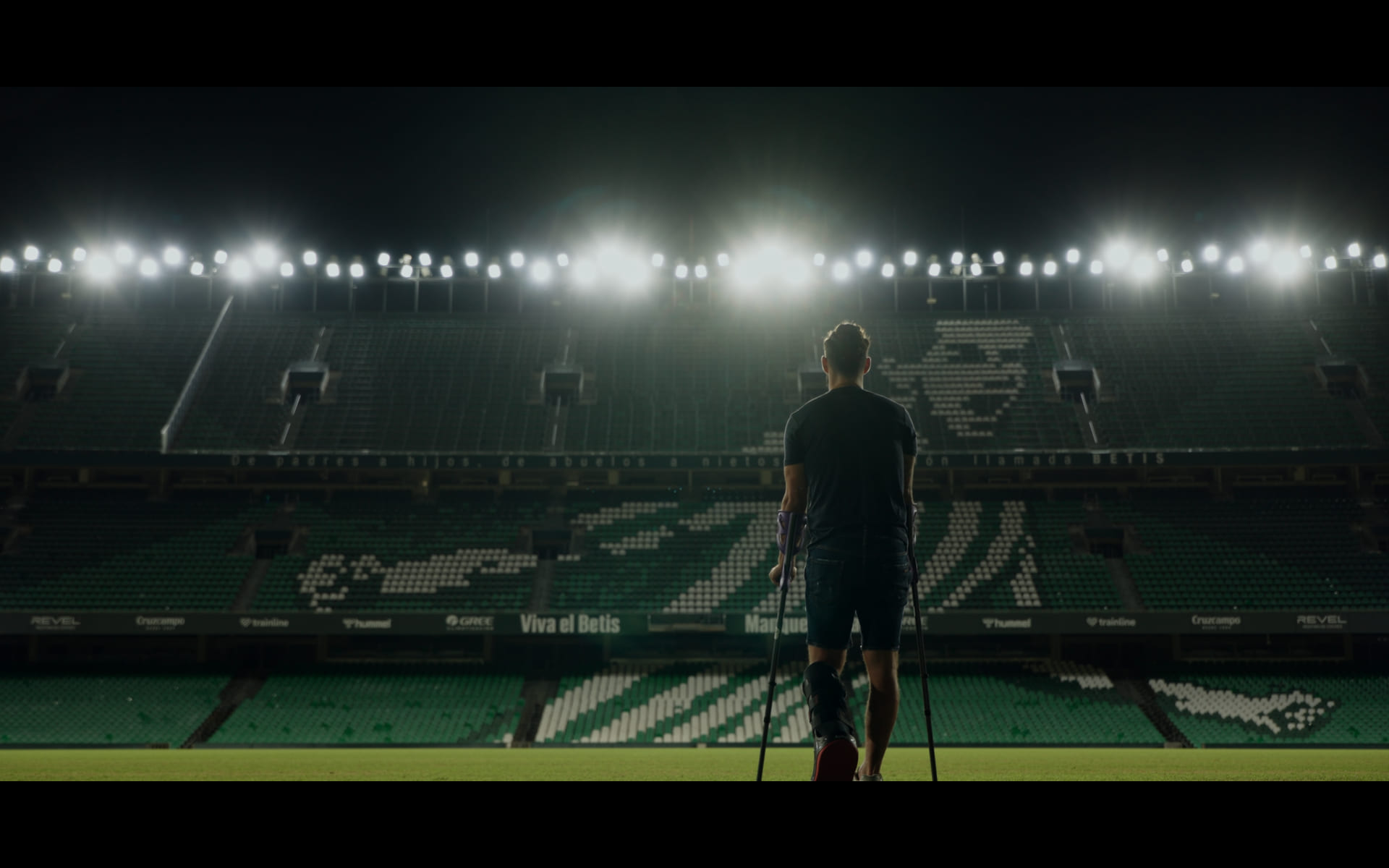
The city will be transformed into a giant cinema screen, featuring screenings, special cycles, talks, workshops, and major events, thereby strengthening its relationship with the city's traditional cinemas and incorporating the presence of multiplex cinemas. The programme can be enjoyed in iconic venues such as the Cervantes Cinema, the Alameda Theatre and the Avenida Cinema, as well as the MK2 Nervión Plaza complex (with five screens) and the Odeón Plaza de Armas complex (with four screens).
And the imposing Cartuja Center CITE, the venue for the Festival's major events. Its auditorium, with the most advanced sound systems available today, a 180-square-metre screen and an 820-square-metre stage, is a unique setting for hosting major events. For example, the presentation of a feature film with a strong emotional connection to Seville: 'En silencio. La resiliencia de Isco Alarcón' (In Silence. The Resilience of Isco Alarcón) - the first feature-length documentary by actress, screenwriter, director and producer Sara Sálamo - which will compete in Panorama Andaluz. This film brings football lovers closer to independent cinema and film buffs closer to the hidden epic of the sport, revealing the intimate struggle of Betis midfielder Isco Alarcón against the injury that has kept him off the pitch.






